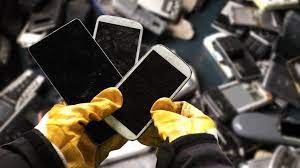E-waste: Five billion phones to be thrown away in 2022

According to the international waste electrical and electronic equipment (WEEE) forum, 5.3 billion mobile phones will be disposed of worldwide in 2018.
The growing environmental problem of “e-waste” is highlighted by its estimate, which is based on statistics from international trade.
People tend to hang on to their old phones rather than recycle them, according to the findings of this study.
However, the copper used in wiring and the cobalt used in rechargeable batteries are both precious materials that must be mined rather than recycled from used gadgets.
Scientists advise mining electronic garbage instead of the planet.
It’s estimated that millions of unused electronic devices are currently “stockpiled in drawers.”
WEEE director general Pascal Leroy noted, “People tend to not realize that all these seemingly little elements have a lot of value and together at a worldwide level represent tremendous volumes.”
In Europe, where roughly a third of all mobile phones were manufactured, nearly half are no longer in use.

The WEEE claims that its studies suggest that by 2030, the annual “mountain” of electrical and electronic waste will increase to 74 million tonnes, including everything from washing machines and toasters to tablets and GPS gadgets.
The Royal Society of Chemistry started a campaign earlier this year to advocate for the recycling of electronic waste in order to create new products, drawing attention to the fact that wars throughout the world, such as the one in Ukraine, pose a threat to precious-metal supply chains.
WEEE representative Magdalena Charytanowicz said, “These devices offer many important resources that can be used in the production of new electronic devices or other equipment, such as wind turbines, electric car batteries, or solar panels, all of which are crucial for the green, digital transition to low-carbon societies.”
The United Nations International Telecommunication Union has set a target of increasing the recycling rate of electronic waste from the current 17% to 30% worldwide by the end of next year.
One of the “fastest growing and most complex waste streams that affects both human health and the environment, as it might include dangerous elements” is highlighted.
Based on their findings, Material Focus concludes that over 20 million usable but underused electrical goods are being stored in British homes at now, with a potential value of £5.63bn.
The report also found that the typical UK home could make around £200 by selling their unused technology.
The group’s website runs an awareness campaign with useful information like where to find local recycling centers.
More could be done, according to Mr. Leroy.
Some of the measures taken to facilitate the return of such products include “providing collection boxes in supermarkets,” “picking up of minor broken appliances upon delivery of new ones,” and “giving PO [postal service] boxes to return small e-waste,” as he put it.
Join our 100,000+ members and never miss our members’ exclusive Delsu Breaking News.
Gain Access to Our Private News Room
Popular Stories right now
- Samsung Roadmap Includes 1.4-nm Production by 2027
- Declare flooding national emergency, Diri, others tell FG
- The proposed sale of power plants







